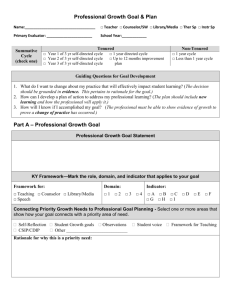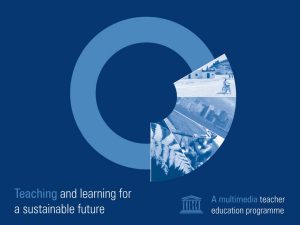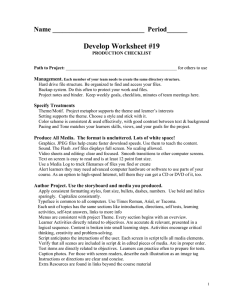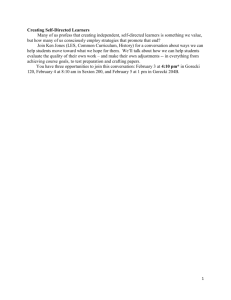Initial Ideas for Action Items — How Can We develop... these themes Theme: Understand The Magnitude Of The Change
advertisement
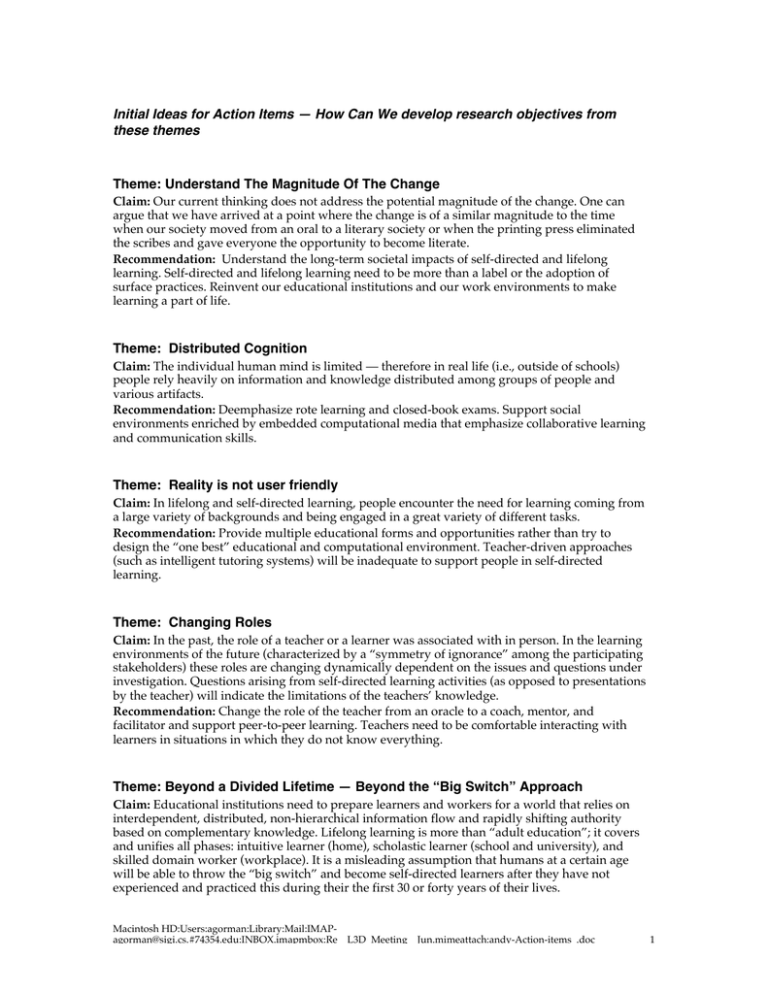
Initial Ideas for Action Items — How Can We develop research objectives from these themes Theme: Understand The Magnitude Of The Change Claim: Our current thinking does not address the potential magnitude of the change. One can argue that we have arrived at a point where the change is of a similar magnitude to the time when our society moved from an oral to a literary society or when the printing press eliminated the scribes and gave everyone the opportunity to become literate. Recommendation: Understand the long-term societal impacts of self-directed and lifelong learning. Self-directed and lifelong learning need to be more than a label or the adoption of surface practices. Reinvent our educational institutions and our work environments to make learning a part of life. Theme: Distributed Cognition Claim: The individual human mind is limited — therefore in real life (i.e., outside of schools) people rely heavily on information and knowledge distributed among groups of people and various artifacts. Recommendation: Deemphasize rote learning and closed-book exams. Support social environments enriched by embedded computational media that emphasize collaborative learning and communication skills. Theme: Reality is not user friendly Claim: In lifelong and self-directed learning, people encounter the need for learning coming from a large variety of backgrounds and being engaged in a great variety of different tasks. Recommendation: Provide multiple educational forms and opportunities rather than try to design the “one best” educational and computational environment. Teacher-driven approaches (such as intelligent tutoring systems) will be inadequate to support people in self-directed learning. Theme: Changing Roles Claim: In the past, the role of a teacher or a learner was associated with in person. In the learning environments of the future (characterized by a “symmetry of ignorance” among the participating stakeholders) these roles are changing dynamically dependent on the issues and questions under investigation. Questions arising from self-directed learning activities (as opposed to presentations by the teacher) will indicate the limitations of the teachers’ knowledge. Recommendation: Change the role of the teacher from an oracle to a coach, mentor, and facilitator and support peer-to-peer learning. Teachers need to be comfortable interacting with learners in situations in which they do not know everything. Theme: Beyond a Divided Lifetime — Beyond the “Big Switch” Approach Claim: Educational institutions need to prepare learners and workers for a world that relies on interdependent, distributed, non-hierarchical information flow and rapidly shifting authority based on complementary knowledge. Lifelong learning is more than “adult education”; it covers and unifies all phases: intuitive learner (home), scholastic learner (school and university), and skilled domain worker (workplace). It is a misleading assumption that humans at a certain age will be able to throw the “big switch” and become self-directed learners after they have not experienced and practiced this during their the first 30 or forty years of their lives. Macintosh HD:Users:agorman:Library:Mail:IMAPagorman@sigi.cs.#74354.edu:INBOX.imapmbox:Re__L3D_Meeting__Jun.mimeattach:andy-Action-items_.doc 1 Recommendation: Close the gap between school and workplace learning by allowing learners to engage in activities requiring collaboration, creativity, problem framing, and distributed cognition. Integrate learning into working and playing instead of conceptualizing it as a separate activity. Theme: New Interdisciplinary, Cross-Cultural Collaborations Claim: Realistic problems are framed and solved by groups , communities and organizations rather than individuals. The participants come from different “cultures” (different profession, different countries, different objectives) and must have the willingness, the experience, the environments and the tools to abe able to learn from each other. Recommendation: The role of a community of learners with different backgrounds needs to be explored and explicitly incorporated into our conceptual frameworks and computational media. Develop environments supporting mutual learning and mutual understanding. Theme: Economics and the Quality of Education Claim: Education needs to be cost-effective. While new media offer the possibility to reduce the cost of education, an equally important goal is to improve the quality of education (“If you think education is expensive, try ignorance!”). Recommendation: Explore the scalability of educationally desirable innovations (for example, the Nobel prize winner as a private coach does not scale). Design and develop computational media to support learners in their own doing. Create new role distributions between human teachers and computational media. While there is no evidence that all the tasks of a teacher can be ‘handed over’ to a computer, new media allow us to rethink the role of the teacher. Theme: Avoid To Reinvent The Wheel Claim: Self-directed learning should not underestimate the knowledge of the past. Let Learners stand on the shoulders of the giants who proceeded them! Recommendation: Self-directed learning (as any other approach towards learning and teaching) should complement other approaches. Instructionist approaches are suited to make the knowledge of the past available under the guidance of an experienced teacher. Theme: Support Collaborative Knowledge Construction Claim: While we face too much information in the abstract, in most specific problem situations we do not have enough knowledge. Recommendation: Learning can not be restricted to finding knowledge which is “out there”. If nobody in a group knows the answer, we have to create new knowledge. Create environments which stimulate innovation and creativity by exploiting breakdowns, symmetry of ignorance, experimentation, and external objects serving as objects-to-think-with and objects-to-talk-about. Theme: “Basic” Skills — Core Knowledge Claim: A lifelong learner cannot learn any arbitrary skill on demand—prerequisites normally limit what a person can and cannot learn. This raises the important question: what “basic skills” are required in a world in which occupational knowledge and skills become obsolete in years rather than decades? Recommendation: The “old” basic skills (such as reading, writing, and arithmetic) once acquired, were relevant for the rest of a human life; modern “basic skills” (tied to rapidly changing technologies and media) change over time. Education cannot be reduced to mere skill acquisition and information processing, but needs to prepare students to become self-directed and lifelong Macintosh HD:Users:agorman:Library:Mail:IMAPagorman@sigi.cs.#74354.edu:INBOX.imapmbox:Re__L3D_Meeting__Jun.mimeattach:andy-Action-items_.doc 2 learners by creating passion and deep understanding about their existence as human beings in the future knowledge society. Theme: New Assessment Strategies Claim: Self-directed learning makes assessment strategies infeasible in which everyone is measured with the same yardstick and in which human capabilities are reduced to a number. New approaches should not avoid the assessment challenge —it is legitimate to ask for evidence that the “new” approaches are working. Recommendation: Assessment strategies developed for instructionist learning are not suited to assess for self-directed learning. The development of new assessment strategies addressing the needs of self-directed learning is an important research problem. Theme: Take Motivation Seriously Claim: If we want people to be lifelong learners, we must make sure they enjoy it. Motivation is central to learning. Recommendation: The beginnings of a motivational theory urgently need to be developed further. One of the benefits of integrating working and learning is the potential increase in motivation. Motivation to learn new things is critically influenced by optimal flow, a continual feeling of challenge, the right tools for the job, and a focus on the task. Theme: Develop Innovative Media in Support of Lifelong, Self-Directed Learning Claim: Non-computational media (such as books, films, etc.) in principle cannot analyze and critique the work of learners and contextualize new information, advice and help to their work. Recommendation: The interpretive power of computational media is needed to support people in their own doing. To make self-directed learning economically feasible, new kinds of media are needed which are able to analyze and critique a students work. Develop requirements and create prototypes of computational environments in support of self-directed learning; examples of such requirements are: they must be user-directed and simultaneously supportive; provide information in context; exploit breakdowns as opportunities for learning, allow end-user modification and programmability; support a range of expertise, and promote collaboration. Theme: Educate New Kinds Of Professionals Claim: Education must prepare humans for a world where learning is an integral part of their lives. Industrial-age models of education are inadequate to prepare students to compete in the knowledge-based workplace. Recommendation: Create educational settings for young researchers and students (at a formative stage in their careers) in which they can learn how to learn, are able to engage in personally meaningful activities, exploit the power of media, and collaborate with others in interdisciplinary and cross-cultural settings. Theme: Beyond Technology: Change Mindsets and Organizations Claim: There is no evidence from the past that technology by itself has changed education, learning and teaching in any fundamental way, especially technologies used in the “gift wrapping” mode. Recommendation: Develop new mindsets and attitudes among (1) individuals (e.g.: learners, teachers, researchers, policy makers, etc.) and (2) organizations (e.g.:, nurturing a collaborative work environment, being willing to undergo culture changes). Macintosh HD:Users:agorman:Library:Mail:IMAPagorman@sigi.cs.#74354.edu:INBOX.imapmbox:Re__L3D_Meeting__Jun.mimeattach:andy-Action-items_.doc 3

